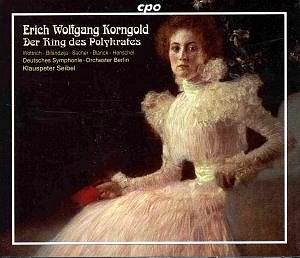This is the work of a seventeen year old composer
- his first opera; more operetta, in fact, than opera. It was
written in 1914 but not premiered until 1916 when it shared a
double bill with his much more dramatic Violanta. The conductor
was Bruno Walter and the cast included Maria Ivogün and Karl
Erb.
The plot: Arndt celebrates with Laura, his young
wife, his appointment as music director and his new found wealth
from a legacy via his aunt. The envious Vogel pays the couple
a visit and suggests that all this good fortune can only be preserved
by endangering it. Arndt decides to ask Laura about her former
life. She is angered but the two reflect and reconciled decide
that the sacrifice to good fortune should be the calculating Vogel.
They show him the door.
The music has brilliance but none of the super-heated
exuberance of Die Kathrin, or Die Tote Stadt or
Violanta or Der Wunder der Heliane. What strikes
one consistently about this music is its light-hearted playfulness
- a quality familiar from his music for his score for Errol Flynn's
Adventures of Robin Hood film. Its levity links with Mozart's
Die Entführung aus dem serail and Cosi fan tutte
rather than with the bigger guns of Don Giovanni. The
feathery joy and relaxation evident in scene 5 recalls the Dance
Rhapsody of Frank Bridge. This work is more of a jeu d'esprit
than anything else although at the start of scene 6 we get a premonition
of the lunging romance of the fully mature writing in Die Kathrin.
The music is however better summed up by the chuckling ensemble
in scene 9.
This is well documented, performed and recorded
in a lively theatrical ambience. Not essential Korngold unless
the lighter Viennese palette appeals in all its frothy caramel.
Rob Barnett
